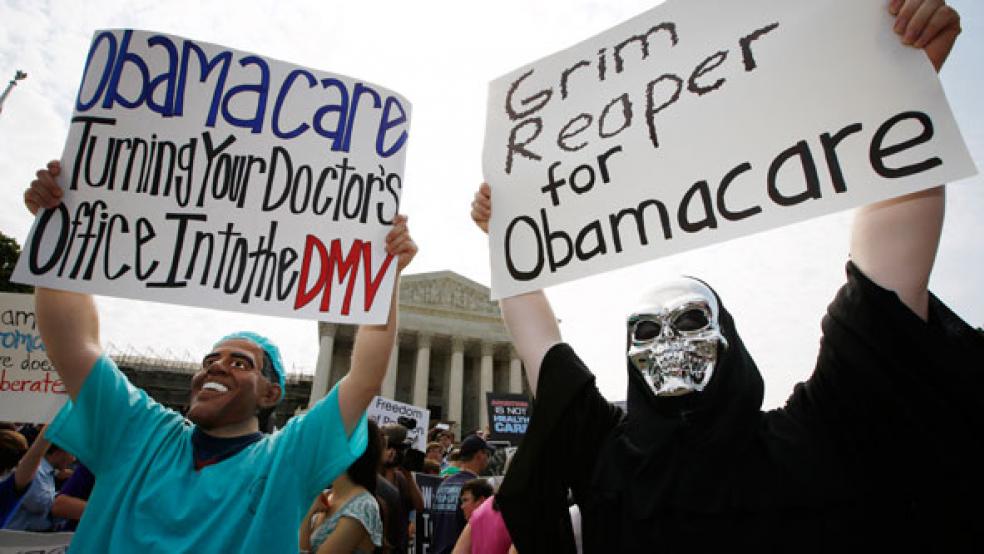Lost in the hubbub surrounding the Supreme Court’s decision on Obamacare is that small businesses are among the big losers. For President Obama, triumphing over Republicans is pure nectar; stomping on the nation’s job creators is surely dangerous.
Mitt Romney got into hot water for suggesting that corporations are, after all, people. No one can dispute that small businesses are just that, people – people who fear the complications and costs of the healthcare bill and who sued, through their advocacy group the National Federation of Independent Businesses, to prevent its implementation. This in spite of their long-standing alarm over the rising cost of providing healthcare for their employees.
 Why are small businesses so opposed to the Patient Protection and Affordable Care Act? Sam Graves, chairman of the House Committee on Small Business, who held hearings on the matter, recently sent a letter to President Obama highlighting companies’ concerns. He quoted one restaurant owner who said, “The real irony here is that in the name of expanding health care coverage, Congress and the administration are making it more difficult for workers to enter and eventually be promoted in the workforce at a time when we need job growth.”
Why are small businesses so opposed to the Patient Protection and Affordable Care Act? Sam Graves, chairman of the House Committee on Small Business, who held hearings on the matter, recently sent a letter to President Obama highlighting companies’ concerns. He quoted one restaurant owner who said, “The real irony here is that in the name of expanding health care coverage, Congress and the administration are making it more difficult for workers to enter and eventually be promoted in the workforce at a time when we need job growth.”
The head of a supermarket chain told the committee, “The ‘Shared Responsibility’ provision forces us to try to decide between two bad decisions,” offering more expensive benefits to an expanded number of workers or face difficult employee relations problems. He concludes that “unless significant changes are made… [the act] stands to do irreparable damage to many small businesses.”
Are these business owners joining forces out of partisan spite? Not likely. Dan Danner, the head of the NFIB, blasts legislators of both parties for not fixing what is broken in the U.S. Rather, most small firms have weighed the benefits and costs of Obamacare and found it threatening – especially the health insurance tax and the employer mandate. Mr. Graves notes that the law’s small business tax credit (available to offset the cost of insurance) is not very helpful; contrary to White House estimates that between 1.4 and 4 million companies would be eligible for that benefit, only 170,300 were able to claim the credit in 2010.
Congressman Graves also observes that despite President Obama’s assurances that healthcare costs would fall, a new report from the administration concludes that for 2011 through 2021, national spending on healthcare will advance on average at 5.7 percent per year, and that Obamacare will add $478 billion to the total. Though the White House claimed that insurance premiums would drop, the report projects the law will boost premiums by 4.1 percent. Mr. Graves notes: “Equally troubling, by 2021, about fifty cents of every dollar spent on healthcare is expected to be financed by the government.”
Mr. Graves’ committee focuses on more than healthcare. It is also looking into whether the EPA is abiding by the Regulatory Flexibility Act, under which federal agencies are supposed to assess the economic impact of their regulations on small businesses.
The cost of red tape has become a hot topic; in a Gallup poll earlier this year, nearly half of small companies cited worries over the healthcare bill and government regulations in general as reasons they were reluctant to hire. Last fall small companies listed as their number one concern the cost of complying with government regulation – above consumer demand or credit availability.
Their anxiety is understandable. A group called Small Businesses for Sensible Regulation notes that there are currently nearly 4,200 new rules pending in Washington, of which more than 800 would directly impact small firms.
Sensitive to these concerns, the White House (at the prodding of the Business Roundtable) reminded the heads of federal agencies in March that they should consider the “cumulative effects of regulations on small businesses and startups” in promulgating new rules and enforcing existing ones. Ironically, the Business Roundtable cited three specific sources of strangulation – environmental law, Obamacare and Dodd-Frank – all bearing the heavy footprint of the Obama White House. It is beyond hypocritical for that same authority to try to soften the blow.
Hypocritical, perhaps, but politically important. Americans like small businesses, and they trust them. They understand their importance to our recovery and the damage that has been done by an activist White House whose leftist ideology renders the profit motive a mute supplicant.
With President Obama’s reelection possibly hinging on job creation, and especially given the discouraging recent employment data, his administration might consider listening to the concerns of small business. The Business Roundtable just released a list of 60 major new pending rules and regulations from the federal government – all of which may dampen economic activity. The NFIB is so worried about the uncertainty created by Obama’s legislative tsunami that it is supporting the Regulatory Freeze for Jobs Act, a bill that would prohibit important new regulations from taking effect before the unemployment rate drops to 6 percent or for two years, whichever is shorter. Embracing such a “time-out” would be an excellent move for the embattled White House, and most definitely for the country.






